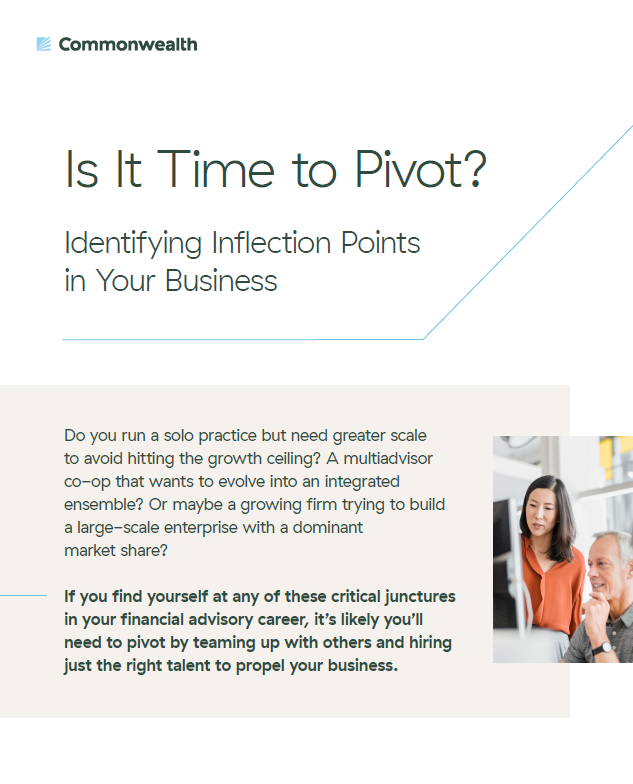

As your business grows, it changes. You bring new clients onboard; current clients’ needs shift; service requirements expand—change is constant as you grow.
When firms approach critical growth points, short-term issues often get more attention than longer-term strategic planning. If you get caught up in a short-term, day-to-day solutions approach, you may end up stuck in a repeating cycle, running fire drills but not making progress on long-term productivity and efficiency gains. To avoid this, be intentional about driving business efficiency and commit to making continuous, incremental investments to institutionalize your firm over time. Set up your business to scale economically and establish a nimble infrastructure that’s ready to meet growth opportunities with you.
How can you manage strategic planning, change, and firm growth while maintaining the quality of service and client relationships your business is known for? Use the following framework to get started.
Planning begins with an assessment of your firm’s level of productivity. The best way to do this is to use benchmarking data.
The 2021 InvestmentNews Adviser Compensation & Staffing study reported that the median revenue per head count for independent firms was $284,250.1 This number reflects the revenue that each person, regardless of role, can support at an independent firm. Your ideal benchmark will depend on the size of your firm, with larger firms tending to operate with higher productivity given their scale advantages. Take a look at this number to understand your firm’s overall productivity compared with that of your peers and give yourself a realistic assessment of your business’s performance.
Once you know your revenue per head count, you have a great start on driving business efficiency. But there are other important factors to think about as you set up your framework for scaling your business to compound growth.
Prioritize objectives. To ensure everyone at your firm is aligned on the highest priorities, identify which objectives and strategies the firm should pursue in both the near and the long term. Otherwise, you may find your team moving in different directions rather than moving together toward high-impact goals.
Align processes. If your firm’s advisors or staff take different approaches to accomplish tasks, this can derail your efforts to scale. Keep processes and procedures consistent across your organization to save time, create a consistent and repeatable experience for clients, and minimize or eliminate missteps.
Evaluate your approach. Assess your firm’s philosophies and methodologies to ensure consistency for everyone at your firm. Similar to your processes, investment management and financial planning are most efficient when you and your advisors embrace a unified philosophy and methodology.
Ensuring that your firm’s lead advisors have maximum time to focus on client relationships and business development instead of day-to-day account tasks or operations is critical for a growing business. Make time to systematically approach the following factors to set your business up for success when building scale.
1. Organize Your Processes
Proactively evaluate your firm’s core processes and identify opportunities to be more efficient, offer enhanced client experience, and operate with greater consistency. For example, streamlining your processes for onboarding clients or preparation to support recurring meetings could free up resources to focus on other, higher-value client interactions.
2. Delegate, Delegate, Delegate
As leadership shifts its focus to oversight and other strategic activities, prioritize delegation efforts to ensure consistent delivery of services and operations support before, during, and after changes in responsibilities.
What can you outsource? Look into what can be outsourced. At Commonwealth, for example, advisors can outsource the management of model portfolio implementation by using our fee-based Preferred Portfolio Services® platform and access a range of other outsourced business solutions.
How can you maximize delegation? As firms evolve, roles and responsibilities often become ambiguous, which can be confusing for employees and hinder delegation or collaboration. Be deliberate about how you assign responsibilities across your firm and be sure to communicate your reasoning to your entire team.
Should you add leadership roles? Large firms with sizable resources often add management positions and other highly skilled roles to allow lead advisors to focus more on clients and relationship development.
3. Automate for Efficiency
Technology can be a critical lever for streamlining business processes. Assess the areas where your firm could use technology for automating and augmenting your current services. Thoughtfully integrated technology has powerful potential to improve your firm’s core processes.
Using this framework to institutionalize your business operations can help your firm increase advisory capacity and streamline efficiency to enable firm growth. And these enhancements can help your firm deliver a consistently great client experience.
If you’re wondering how to move your business to the next level, you should be thinking about driving business efficiency to support growth. Be ready to adjust your practices and processes to enable maximum efficiency as your business evolves. By creating a strong and scalable infrastructure, you’ll put yourself on the path to achieving a level of performance that can turn a successful firm into an exceptional one.
Each firm is unique and faces unique challenges as they grow. Here’s the story of a Commonwealth advisor who successfully drove business efficiency and saw her business thrive as a result. She shares insights on her journey and offers some thoughts for other advisors as they consider their own growth plans.

FREE DOWNLOAD
Identifying Inflection Points in Your Business
Whether you run a solo practice or a multiadvisor firm, if you’re looking to take your business to the next level, it’s time to decide if you’re at a critical growth juncture and what that means for your future.
1. InvestmentNews Annual Advisor Benchmarking Study
This post originally appeared on Insights, a blog authored by subject matter experts at Commonwealth Financial Network®, Member FINRA/SIPC, a Registered Investment Adviser.

Relationships are key to our business but advisors are often slow to engage in specific activities designed to foster them.

Whichever path you go down, act now while you're still in control.

Pro-bitcoin professionals, however, say the cryptocurrency has ushered in change.

“LPL has evolved significantly over the last decade and still wants to scale up,” says one industry executive.

Survey findings from the Nationwide Retirement Institute offers pearls of planning wisdom from 60- to 65-year-olds, as well as insights into concerns.
Streamline your outreach with Aidentified's AI-driven solutions
This season’s market volatility: Positioning for rate relief, income growth and the AI rebound
